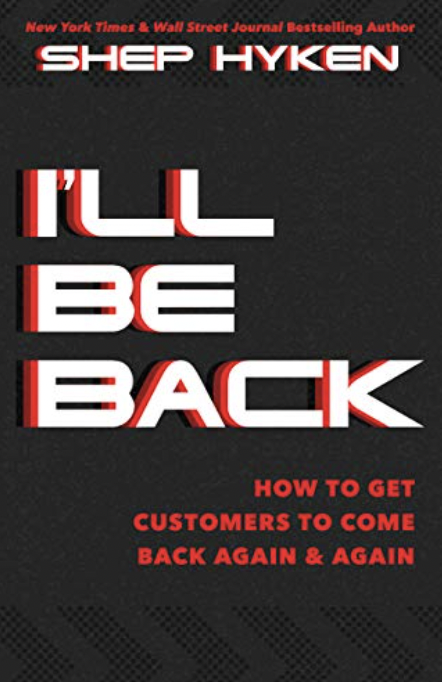What can you do to maintain an excellent customer experience through significant budget cuts? Shep Hyken, customer service and experience expert, New York Times and Wall Street Journal best-selling author, joins us now to discuss one of his latest Forbes articles, “Creating an Amazing Customer Experience on a Budget.”
Jim Fitzpatrick:
I know a lot of you business owners and entrepreneurs out there are concerned about this, especially during times like this, when you might be experiencing a little bit of a cutback and you say, “Are we still going to be able to deliver on our promise to our customers today?” So Shep, thank you so much for taking the time out of your busy schedule to join us once again on the show. I really appreciate it.
Shep Hyken:
Great to be back here. Thanks for having me.
Jim Fitzpatrick:
Sure. So what prompted this article? There must have been a motivation, somebody probably called you and said, “Hey, we got a problem here. We’re cutting back and we’re afraid it might cost us some customers or at least in the way of the experience.”
Shep Hyken:
Sure. The article is probably one that I’ve written in different versions over the years because this is what happens in scary or tight times and it could be a recession, a pandemic, the exact situation we’re in now. Essentially people go, “Okay, I’ve got to save money, I’ve got to cut.” And the mistake they make is cutting places that customers notice. And it’s okay to cut for the right reasons, but I’ll give you the perfect example. And I realize we’re out of the pandemic, but right as we were entering into the pandemic, the first month or two, one of my clients in the hotel industry was saying, “We went from 85% to 90% occupancy on average down to under 20%.” And he just was freaking out, he couldn’t keep his staff and he let most of his team go, which included the housekeeping staff. And I said, “You know what? You need to realize that you have to keep those rooms clean and if you don’t, I don’t care how low the rate is, how nice the room is, if it’s dirty, it’s dirty and the customer’s not coming back.”
Jim Fitzpatrick:
That’s right.
Shep Hyken:
And so that was one example. There was a restaurant that decided to cut a little bit so they thought, “Well, let’s cut the high quality ingredients and let’s find some ingredients that are a little less expensive.” And it was so noticeable, I actually went there and said, “This doesn’t taste anything…” “Yeah, we had to change things.” And what happened? Ultimately, that restaurant went out of business.
Jim Fitzpatrick:
Wow.
Shep Hyken:
So much customers noticed. We don’t want that to happen.
Jim Fitzpatrick:
No.
Shep Hyken:
So a short version of this is, if you’re going to cut, cut places that can’t be seen by the customer.
Jim Fitzpatrick:
Right. There’s no question about it. That touchpoint is so incredibly important and usually something that can be overcome by cutting in a different area. I mean, you don’t have to go right for that frontline worker or the quality of the meats if you’re in the restaurant business or what have you, right?
Shep Hyken:
We’re running up against two really tough issues right now for a lot of companies. And number one is everything’s getting more expensive. Okay. No doubt, inflation’s hitting it, the cost of whatever. I think that’s going to settle down, it’s just part of it was there was two years of this pandemic where supply and demand issues, depending on the type of business you’re in, were just so out of whack compared to the norm. And it’s just going to take a little while for things to figure out where they are and get back to where everybody’s comfortable. The other issue is the employment issue, keeping good people. And in order to keep good people in many businesses right now, we’re having to pay much more, which is eroding our margins.
Jim Fitzpatrick:
That’s right.
Shep Hyken:
And as business owners, we must recognize that the new way of doing business might be a little thinner margin than we had in the past. And we’ll figure out a way, once again, to balance it out, but for right now, we’ve got to do that. And as long as you’re talking about restaurants, I walked into a restaurant in a New York hotel and it looked like there were plenty of tables and the manager nicely said to me, “I’m really sorry, you have to wait. We don’t have enough staff for all of the tables so we thought rather than give you a bad experience, we would ask you to wait a few minutes so that a table could become available.” Because a bad experience would mean all the tables were filled with not enough people to take care of them and your breakfast is going to end up taking an hour and a half instead of 35, 40 minutes, the whole thing.
Oh, that was really smart. Now, did the customer notice? Yeah, they had a little bit longer line, but what the customer didn’t notice was a downgrade in the service that they had, had in the past or what was the expectation of this restaurant providing in the typical times. So think about that, I think where are the places? The other thing to think about is the cost of delivering a good service experience from the people to people standpoint hasn’t changed. It’s just people doing the right thing, saying the right things and being properly trained to do the right thing.
Jim Fitzpatrick:
That’s right.
Shep Hyken:
And the simplest idea is just manage every interaction, every moment of truth that a customer has with a company, anytime they interact, it’s an opportunity to form an impression. Get all your people on board with understanding how important it is to manage each and every one of those interactions. And I know I’m rambling here, but I’m going to end with this and then you can ask me more questions if you want.
Jim Fitzpatrick:
It’s quite all right. It’s great stuff.
Shep Hyken:
I want to end with this one idea, with my stream of consciousness on this. And that is, the question that you want to ask in your own head, if you are interacting with a customer, just simply ask, is what’s happening right now good enough to get that customer to come back next time?
Jim Fitzpatrick:
Right.
Shep Hyken:
That’s it. And if it is then you’re delivering on the service promise and the expectations that they have of you.
Jim Fitzpatrick:
That’s right. And the notion that the customer’s going to understand that these are tough times and if we deliver terrible service, but they got their hamburger and they got their Coke and they’re down the road. That doesn’t cut it, does it?
Shep Hyken:
Not anymore.
Jim Fitzpatrick:
That’s right.
Shep Hyken:
For a short time customers were empathetic-
Jim Fitzpatrick:
A little more forgiving.
Shep Hyken:
… to the situation. No more because there’re companies that have figured out how to do it. By the way, just like whenever I do a speech, I talk about how we don’t compete anymore with a direct competitor as far as what our customers expect of us, we are competing with the experiences that they’ve had with the best companies in the world.
Jim Fitzpatrick:
Yeah.
Shep Hyken:
So I’ll give you an example. Target, for example, now that’s a large company and they have had the lowest turnover they’ve had in years. This was about six months ago, they reported that the turnover was low, people were staying and they were very happy. What did they do? They raised wages, they created some flexibility on whether people would work evenings and weekends and if they did, they were compensated a little differently than the mainstream hours. And they have a great comp program that goes beyond just salary. On top of that, by the way, you still have to like the leadership and management of the company because if you’re not happy with the people you work with or work for, you’re going to go out looking for another job that’s going to pay close to what it is and you’re going to lose that person. So I will add that even though we’re talking about customer experience, the employee experience is really important here to drive and keep your customer experience going.
Jim Fitzpatrick:
Very good point. There’s a saying that employees don’t leave companies, they leave managers.
Shep Hyken:
Yes.
Jim Fitzpatrick:
And that’s so true out there, isn’t it? You could be with a great brand and a great company that offers phenomenal benefits, but if you don’t get along with your manager, that’s going to be a reason to leave that position, isn’t it?
Shep Hyken:
Yep. Two articles I wrote for Forbes in the last month or so, one was on how you can get customers to trust you. And the next one was, how do you get employees to trust you? And really at the end of the day, it’s almost the same, you want your customers to come back, you want your employees to come back, in other words, you want them to stay. And we have to really be focusing on what are we doing to create that consistent and predictable experience that the customer’s always had on a little bit tighter budget. And one other idea is to go to your vendors, the people who you buy from and say, “Look, this is the situation, I have to figure out a way to save money. Can you help me do this?” And this is really cool and some of our companies watching this today, some of the entrepreneurs, small businesses, they’re not selling B2C, business-to-consumer, they might be in the B2B world. So this really applies, they can think about this too.
Jim Fitzpatrick:
Sure.
Shep Hyken:
We want to become partners with some of our customers. If we’re in the B2B space, especially that’s important. So if we want to call our vendor and say, “Hey, I need to figure out ways to cut. Can you help me? I’m not asking you simply to reduce your price. I mean, it would be great if you would drop the price, that’s fine. But what can we do to work together to optimize the relationship we have that might save us a little bit of money?” And that might be something as well, “Is there any way, instead of us bringing you product once a week, can we do it once every two weeks? That’s going to save a delivery charge.”
There’re different ideas that you can get creative about, maybe it’s the way we purchase. Again, we don’t want to be that restaurant that changes the ingredients that’s noticeable by a guest, but we do want to find ways to partner. Ford Motor Company did this with all of their vendors and he said, “Look, we need to cut, everybody needs to cut, how are we going to do this? Partner with us and figure out ways that we can save money and without you losing money.” What a brilliant way to put it, very partnership focused rather than just, “Hey, give me the best deal or I’m going to go somewhere else.”
Jim Fitzpatrick:
Sure. And businesses today, you touched on it earlier because of inflation and costs being higher, employee costs as well, have passed that on to their end user, their customer to say, “Look, last month this shipment was a $1,000, this month it’s $1,150.” And people understand that, don’t they? As long as the quality is there, as long as the service is there, you haven’t given up on that, then consumers and businesses alike feel okay with that increase, they get it, right?
Shep Hyken:
Yep. And it’s transparency. We talk about the automotive market, how car dealers are making more money than ever because the demand is so high and they don’t have to discount their cars.
Jim Fitzpatrick:
That’s right.
Shep Hyken:
It’s the same thing in so many different industries where the demand is so high. Now, there was a company that manufactured e-bikes, those are the electric city bikes. They weren’t all that expensive compared to if you’re into real mountain bikes and things like that and you put in an electric motor in there. But these bikes were in the $1,500, $2,000 range and this was before inflation, before the pandemic. And you may remember under Donald Trump’s presidency, he created a situation, we want to keep things in America, we want to build it American, if you bring parts in from outside of the country, you’re going to pay a tariff, if you will, a tax.
Jim Fitzpatrick:
That’s right.
Shep Hyken:
Which was fine. And by the way, this isn’t a political statement. This was the explanation that this gentleman gave all of his customers as to why his bikes were more expensive. He said, “I have to pay a tax or a tariff on some of the parts. So here’s the thing I’m committing to you, my margins stay the same, but I have to pass my costs onto you.”
Jim Fitzpatrick:
I like it. It makes sense.
Shep Hyken:
And as a result of that transparency and the way he communicated, he lost nothing in sales.
Jim Fitzpatrick:
Right. That’s fantastic. That’s a great idea by the way and I agree with you. Don’t be afraid to share with your customers why the increase because they get it. We all pay more for gasoline because we get it, there’s a war in Ukraine and there’s a number of other factors involved, but when we pull up to that gas pump, we need the gas and what are we going to do about it? But we also understand the troubles that are happening in the economy and the world that’s going to increase that gas price and I agree.
Shep Hyken:
By the way, gasoline companies, oil companies are making a lot of money right now.
Jim Fitzpatrick:
I know.
Shep Hyken:
And I think that’s where, and I know we’re getting way off on a tangent, but where regulations try to prevent the opportunity for these. Well, they’re not monopolies, they’re not even duopolies, but these companies and there aren’t a lot of them, recognize, “Hey, this is a time for us to make more money.” I’m a capitalist by nature, I believe everybody as entrepreneurs and small business owners and medium size business owners, any size owner for that matter or CEO, we all want to make money, that’s part of what we do. But we have to do it in such a way that’s cognizant of not taking advantage of customers in the situation.
Jim Fitzpatrick:
That’s right. Nobody likes to be gouged, right?
Shep Hyken:
Yep. Because by the way, you’ll accept it. And during the pandemic, there were times that you felt like we were being gouged because it was the only way to get what we got, right?
Jim Fitzpatrick:
That’s right.
Shep Hyken:
Guess what happens when the pandemic’s over?
Jim Fitzpatrick:
That’s right. Yeah.
Shep Hyken:
We remember who gouged us.
Jim Fitzpatrick:
That’s right. Everybody turns into an elephant and keeps that memory and goes, “Ah, I remember going in there and it cost me double.”
Shep Hyken:
Yeah. “They weren’t very nice to me. In a time of need, they didn’t treat me the way they should have.”
Jim Fitzpatrick:
That’s right. Shep Hyken, Customer Service and Experience Expert, bestselling author, keynote speaker, both New York Times and Wall Street Journal Best Selling Author. You guys know the books, we’re showing him right here on the screen, this guy knows customer experience, customer service, what it’s all about, that’s why we love when he comes onto our show. So Shep, thank you so much for joining us on the show, once again, we very much appreciate it. We get so many great comments when you’re on so thank you so much.
Shep Hyken:
Well, it’s great to be here and like the last title of my book, it’s titled, I’ll Be Back. I can’t wait so I’ll be back.
Jim Fitzpatrick:
That’s right. Which we’re showing right now so that’s perfect. All right, thanks.
The Atlanta Small Business Network, from start-up to success, we are your go-to resource for small business news, expert advice, information, and event coverage.
While you’re here, don’t forget to subscribe to our email newsletter for all the latest business news know-how from Atlanta Small Business Network.








